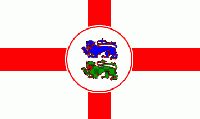Cyprus

| |
| Languages: | |
| Official: | Greek |
| Others: | Armenian, Cypriot Maronite Arabic, English, Sabir (Lingua Franca), Turkish |
| President: | Neofytos Neofytou |
| Vice-President: | Sergios Markosian |
| President of the Senate: | Pavlos Glavkopoulos |
| Area: | 9,251 km² |
| Population: | 1,474,250 Κύπριοι/Κυπραίοι/قبرصلى(Kıbrıslı)/Cypriots/Կիպրոսի/Siprioti/Zivrioti/ܩܘܦܪܘܣ |
| Established: | 2019, Cyprus left the []Commonwealth of Nations]] |
| Currency: | FK pound |
Administration
Cyprus used to be a member of the Commonwealth of Nations until 2019, but Queen Diana was never the island's head of state. The former dominion used to be in the unique position of having one government with two prime ministers, one each from Greek and Turkish extraction, acting as a duumvirate but since Cyprus' independence in 2019 is a federal republic.
The legislative body of Cyprus is a bicameral parliament, the Senate, each chamber representing both populations. It has 56 members representing each district in the country. In the absence of the queen, the presidents of both chambers of the Senate fulfill her ceremonial duties. There are currently proposals to create an appointed chamber called the Council of the State, where there are one member for each town with a population of at least 7,500.
There is lots of local autonomy for the various Greek and Turkish townships.
History
Culture
Ethnic Groups
Greeks
Maronites
Armenians
Latins
The Latins on the island have one of the most tumultuous histories and most frequent changes of fortune of any ethnic group. In the year 1191, Richard III of England took over the island from a Roman renegade warlord, Isaakios Komnenos, who he perceived had insulted his bride-to-be who requested to take refuge on the islands after storms blew her ship off course from the Levant. The English invasion of Cyprus marked the beginning of 400 uninterrupted years of Western dominance on the island and the introduction of the feudal system of the Normans. It also brought the Latin church to Cyprus, which had hitherto been wholly Orthodox in religion and loyal to the Roman Empire. Richard sold the island to the Knights Templar, who in turn ceded the island to the Kingdom of Jerusalem after their brutal rule brought about a series of revolts. It was during the Templar era that a small minority of Catholics of the island settled on the island, but was mainly confined to some coastal cities, such as Famagusta, as well as inland Lefkosia, the traditional capital. Latin Catholics kept the reins of power and control, while the Orthodox inhabitants lived in the countryside. This was much the same as the arrangement in the Kingdom of Jerusalem. The independent Eastern Orthodox Church of Cyprus, with its own archbishop and subject to no patriarch, was allowed to remain on the island, but the Roman Catholic Latin Church largely displaced it in stature and holding property. The various Crusader states in the Levant would survive until the 16th Century, but Cyprus increased its levels of autonomy throughout the decades from Jerusalem and Italian merchants themselves who flocked to the islands in order to corner the markets in the tricontinental Eastern Mediterranean region. The fall of the final Frankish outposts on the Levantine coast brought many thousands of refugees to Cyprus, mostly Latin Rite Europeans, with some mixed European-Levantines, Uniate Levantines (Armenians, Syriacs, & Maronites), and even some Syriac Orthodox Christians who were loyal to the Jerusalemite state but not the Latin Church. Cyprus had also been a frequent place to settle captured Mamelukes and other Arabs who were forcibly converted to Catholicism. The Venetian Republic, the state with the most to gain from the loss of Cyprus as a trade hub, was the first state to swoop in and take over under the pretext of restoring order. They brought in emergency forces from their homeland and all their colonies (Crete, Zara, Lesbos, etc) and ran the island like a prison, putting the native populace to work. Grain was the island’s number one export, and the island fed the Venetian and Genoese colonies on Crimea’s shores and the Black Sea Coast. It is through this trade network that the rough form of pidgin Latin spread from the western Meditteranean to the eastern Mediterranean to the Black Sea, known as ‘Sabir’ (to know) or literally “la lingua franca.” Sabir is at its base a highly simplified form of Genoese that has three major substrates from Old French, Venetian, & Greek with many, many loanwords from Catalan, Turkish, Syriac, Armenian, & Arabic. Although known as “Parra” in Crimea, Sabir exists on a linguistic spectrum with it and usually, for the most part, Sabir speakers and Parra speakers can understand each other.
The Ottoman conquest of Cyprus in 1715 was the nadir of Latin power projection throughout the island. The conquest was short and brutal.
Assyrians
Muslims (Turks)
Armenochori
Jews
Britons
Recent Immigrants
Religion
- Christian (88.9%): 1,284, 804
- Eastern Orthodox Church (76.03%): 1,120,860
- Byzantine Rite (72.91%): 1,074,360
- Maronite Rite (3.12%): 46,500 (only found on Cyprus)
- Catholic Church (12.03%): 177,353
- About 17,341 British nationals of the Cambrian Rite live on Cyprus, but their four parishes are attached to larger regular Latin Rite parishes whose space they are allowed to use by the local bishop
- Armenian Apostolic Church (3%): 44,230
- Assyrian Church of the East (2.45%): 36,122
- Eastern Orthodox Church (76.03%): 1,120,860
- Sunni Muslim (5.67%): 83,592 (numerous Sufi orders such as the Bektashi, Naqshbandi, and Qadiri orders operate on the island while all imams are followers of the Hanafi school of jurisprudence)
- Jewish (.5%): 7,371 (Romaniotes)
- Other (.32%): 4,722 (Protestants, Zoroastrians, Hindus, Buddhists/Taoista, Druze, atheists, etc)
See: http://www.bethisad.com/commonwealth.htm
[PB, JvS]